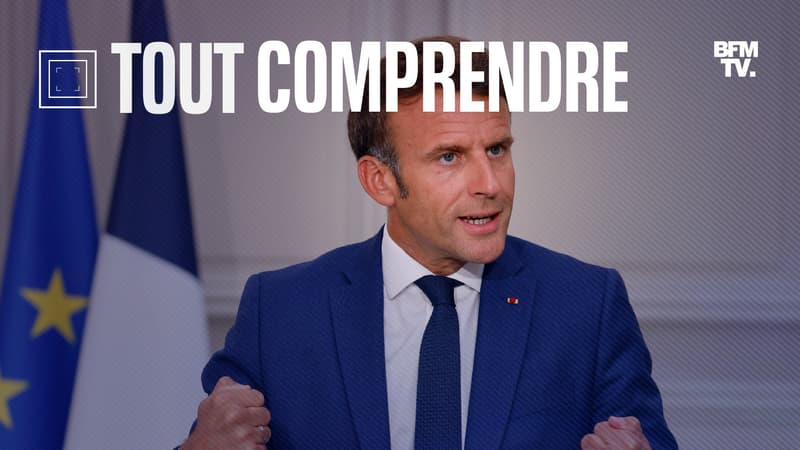After the “great debate” to get out of the crisis of the yellow vests and the Citizen Convention for the climate, Emmanuel Macron launches the National Refoundation Council (CNR) this Thursday in Marcoussis. Conceived as a tool to bring government decisions closer to the French, the opposition as a whole refuses to participate, while even the majority deputies are skeptical.
• The CNR, what is it?
The Head of State announced the launch of this National Refoundation Council on June 3 in the columns of the regional press, in the midst of the campaign for the legislative elections, with the aim of bringing together “the political, economic, social, associative, elected representatives of the territories and citizens chosen by lot” around the same table.
“This will be the body in which we will bring our reforms to life,” said Emmanuel Macron. “The French are tired of the reforms that come from above (…) Paris must be at the service of the countryside.”
The CNR’s objective is to “build”, “with a spirit of dialogue and shared responsibilities”, “consensus on the situation in the country” and “design concrete solutions to the concerns of our fellow citizens”, details the President of the Republic in the letter of invitation to the event on Thursday.
The Elysée sees this day, which takes place from 9:30 a.m. to 6:00 p.m., as “a frank, direct, interactive and unfiltered dialogue”, without further details about the format.
• What topics will you work on?
The CNR is supposed to work on five major issues: school and health, in which the executive promises first results from 2023, in addition to full employment, healthy aging and ecological transition.
“As part of this CNR, I want our goals and means on school and health to be defined,” explained Emmanuel Macron in his interview with the regional daily press. “We are going to give ourselves several months to identify needs and build projects. From there will come a roadmap and quantified resources”.
The “challenge of access to care” will be “at the heart of the matter,” Emmanuel Macron added in a speech broadcast on Wednesday at the opening of the Mutuality’s 43rd congress in Marseille.
• Who participates?
About fifty participants who represent “the living forces of the Nation” in the social are expected this Thursday for this first day, under the high patronage of François Bayrou, The secretary general of the CRN. Among the guests whose presence is confirmed, are the Governor of the Banque de France, François Villeroy de Galhau, the President of the Court of Accounts, Pierre Moscovici, and the President of the Superior Climate Council, Corinne Le Quéré.
The oppositions – from the Nupes to the RN passing through the LR – announced for their part that they would not go there, as did the president of the Senate, Gérard Larcher. The local elected associations, after having stated that they did not want to participate, finally backed down and will be represented. Among the unions, the CFDT, the CFTC and the UNSA said yes while the CGT and FO declined the invitation.
• Why such a boycott?
All political parties, with the exception of the presidential coalition, blame Emmanuel Macron for a media stunt. Sandra Regol, number 2 of the ecologists, sees it, for example, as “a communication tool”, like rebellious France.
Marine Le Pen, for her part, refused to participate “in any structure that seeks to take power away from the National Assembly, which is the representation of the French people.” The same story from the side of Olivier Marleix, the president of the LR group in the Assembly, who calls on Emmanuel Macron to “respect the Parliament that the French have appointed.”
Gérard Larcher, president of the Senate, judges for his part that “wanting to bring parliamentarians together in the same body”, “and representatives of civil society (…) can only lead to a confusion of roles”.
In particular, he explained in France Inter, that there is already a “civil society forum” with the Economic, Social and Environmental Council (Cesse): this third assembly of the Republic, made up of “175 members, representatives of civil society” , “may be consulted by the Government and Parliament on any problem of an economic, social or environmental nature”.
Even some Macronist deputies they are doubtful fearing having to stand aside and not appreciating the chosen method. “If it is to make decisions without even thinking about making the parliamentarians vote, it will be without me,” advances, reassembled, an elected representative of the majority.
On the union side, the announcement of an unemployment insurance reform without prior consultation was considered a casus belli. The CGT also considers that the use of the acronym CNR, the same as that of the National Council of Resistance instituted in the Liberation, resembles a social and historical usurpation.
• What’s next on the show?
The first steps of the CNR should allow Emmanuel Macron “to stimulate a spirit, a method, an agenda”, according to a deputy. In the interview with the regional press, the Head of State had announced “a first sequence of several days and then regular meetings”, promising “a body” in which “to give life to (his) reforms”.
A new date has not yet been announced. Emmanuel Macron also promised associations of local elected officials “regular meetings” around CNR issues, without further details.
As for the proposals that will come out of it, François Bayrou assured this Wednesday at LCI: “The law is the Parliament, the National Assembly and the Senate that will continue to vote on it.” “No one ever said that the Refoundation Council was going to dictate the law”, insisted the general secretary of this new Council.
Source: BFM TV


